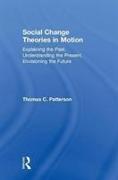Social Change Theories in Motion
BücherAngebote / Angebote:
This book assesses how major social theorists explained processes of change set in motion by the rise of capitalism. It situates them in the milieu in which they wrote. They were never neutral observers standing outside the conditions they were trying to explain. Their arguments were responses to those circumstances and to the views of other commentators, living and dead. Some repeated earlier views, others elaborated subtle differences, and a few changed the way we think. While Patterson surveys earlier writers, his primary focus is on the legacies of theorists writing after the 1840s, who sought to explain the consequences of industrialization, imperial expansion, and the consolidation of nation-states. The theories of Marx, Durkheim, and Weber still shape our understandings of the past and present, and our visions for the future. The author pays particular attention to explanations of the unsettled conditions that appeared after World War I and persist to today: the rise of socialist states, anti-colonial movements, prolonged economic crises, and almost continuous war. After World War II, theorists in capitalist countries, influenced by Cold War politics, saw social change in terms of economic growth, progress, and modernization, their contemporaries in less-industrialized countries wrote about the development of underdevelopment, dependency, or uneven development. In the 1980s, theorists of postmodernity, neoliberalism, globalization, innovations in communications technologies, and the collapse of socialist countries argued that these processes rendered earlier accounts insufficient. Others viewed social change as manifestations of a new imperialism, capitalist accumulation on an increasingly global scale, environmental crises, and the rise of nationalist populism.
Lieferbar in ca. 10-20 Arbeitstagen




